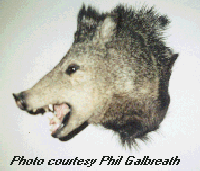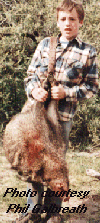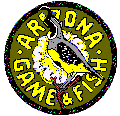|
 A
small pig-like (though not related) animal, javelina, or
collared peccaries, have a sharp sense of smell and relatively
poor eyesight. Considered a range pest in the 1800's, javelina
are now managed as a big game species and are enjoyed by hunters
and wildlife viewers alike. A
small pig-like (though not related) animal, javelina, or
collared peccaries, have a sharp sense of smell and relatively
poor eyesight. Considered a range pest in the 1800's, javelina
are now managed as a big game species and are enjoyed by hunters
and wildlife viewers alike.
Description: A relatively small animal,
javelina average about 1.5 feet at shoulder height and are about 3
feet long from nose to tail. Their average weight ranges from 40-60
pounds. Javelina travel in herds ranging from 8-27 animals. Their
dorsal scent gland, coupled with their sharp sense of smell, helps
each javelina identify members of their herd.
Habitat: Javelina are generally found in low to
mid-level deserts and cactus-studded desert grasslands between
1,000 and 5,000 feet in elevation. Marginal habitat includes pinyon
pine-juniper, oak, and pine-oak vegetation communities between
4,000 and 7,000 feet in elevation.
Food Preferences:
Javelina are essentially herbivores, although they will
occasionally eat insects and other animal matter. They will readily
eat cactus and other spiny and succulent plants, roots, tubers,
forbs, and pods.
 Breeding notes: Breeding occurs throughout the
year, peaking in late winter and spring. Young, or "piglings,"
therefore, are born throughout the year, with high numbers born in
June. A litter consists of one to four piglings, with an average of
two. Breeding notes: Breeding occurs throughout the
year, peaking in late winter and spring. Young, or "piglings,"
therefore, are born throughout the year, with high numbers born in
June. A litter consists of one to four piglings, with an average of
two.
Predators or Enemies:
Coyote
Size Individual Range: 4 square miles
Distribution: 1,000-6,000 feet, mostly south of Mogollon
Rim.
Live Weight: Male: 65 lbs. / Female 50 lbs.
Hunting hints: Javelina have small home ranges. Once
found, they'll usually remain in the same general vicinity.
Glassing an area with binoculars from a high point or good vantage
spot in early morning or late afternoon is a good way to begin your
hunt. An Apache/Sitgreaves National Forest
map is essential.
 Information courtesy Arizona Game & Fish
Department, Region 1-Pinetop,AZ Information courtesy Arizona Game & Fish
Department, Region 1-Pinetop,AZ
|

